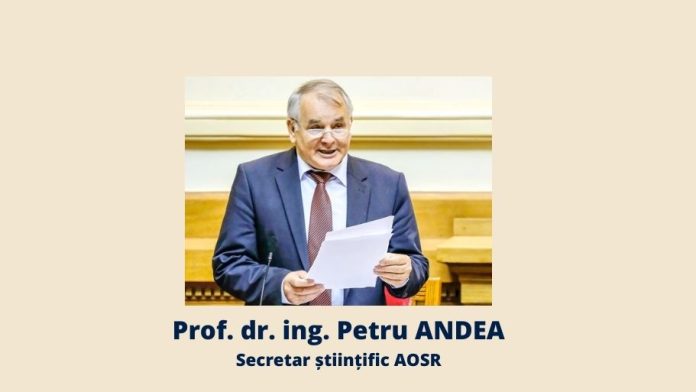Prof.dr.eng. Petru ANDEA, Scientific Secretary of the Academy of Romanian Scientists
As spring begins, the Christian world prepares to celebrate one of its greatest feasts: the Resurrection of our Lord Jesus Christ. It is an opportunity to reflect on the role and place of the church in society today.
It is known that society has always been a support for religious faith. The main support was human, believers are citizens of a state, they respect the laws and political regulations, directing part of the income to the Churches.
Education, culture, health, organized and maintained by the state, are of use to religion, churches and religious personnel.
The state offers religion political protection, legality and security. All this because religion also responds to expectations and participates in the fulfilment of society’s needs.
First of all, through believers, religion influences the whole of social life and the subsystems that exist in society: the system of property, production and consumption, the forms of power, the specifics of culture and civilisation, relations between citizens. On the whole, religion is a positive factor in society. But there are also forms of religiosity that express themselves against progress, urge destabilisation, go against the public and legal order, try to eliminate from social life the communities of other religions, challenge the family, degrade the personality of their adherents, etc.
Secondly, we can point out that religion has generally had the role of participating in achieving social stability. The church is often seen as “a rock of order” in the way of the rolling waves of everyday life.
Thirdly, religion is also an important factor of social cohesion. Faith is the spiritual basis that brings people together, integrates them, mobilises them. They depend on each other on the basis of interests and regulations, but mostly on the basis of shared beliefs. When other forms of cohesion (economic, kinship, political, ethnic) weaken, religion replaces them, offering spiritual consolation, pastoral reconciliation, reintegration into activities or social groups, and replacing loneliness or abandonment.
Religion plays an important role in achieving social progress. While showing believers the way to salvation and happiness in eternal life, religion no longer condemns and considers wealth, prosperity and personal development, achieved through honest work, in the spirit of loving and helping others, a sin. Faith and the church mobilise believers to achieve cultural, moral and economic progress, insofar as they are not against God’s will.
The schools and the first universities were located near churches and monasteries, the teachers were theologians, large libraries were preserved in the places of worship. The cognitive role of religion is still controversial today. The question is whether modem man, connected to the most varied forms of information, can still consider religion as a source of knowledge. There are enough who consider religion to be the spiritual way of life of the ignorant, while philosophy and science are the concerns of intellectuals. We can recall the statement of St. Augustine who appreciated that “ignorance is more precious than knowledge, because the former comes from God and the latter comes from men”. We know that for a believer religion is the only true explanation, but also that many scientists do not dispute the role of religion in spiritual life. Einstein said “he who drinks the cup of science halfway will remain an atheist; he who drinks it to the end discovers God”.
Religion has emerged as a field of concern before the legal and even the political, providing a system of rules and criteria useful for social coexistence.
Later, some of these rules were legally regulated: not to kill, not to steal, prohibition of marriage between close relatives, etc. Other criteria remained only in the religious domain: humility, humility, respect for parents, chastity, etc. Between political and religious life there have always been the most active relations, based on the fact that man is both citizen and believer.
Jesus’ teaching is “give to Caesar what is Caesar’s and to God what is God’s”. But it remains man’s free will and choice what and how much he gives to God and how much to Caesar.
There have been instances of subordination of the state by the church. In such cases, the state was ruled by religious personnel, the oath was religious, education, morality, culture, science were controlled or carried out by the Church.
Subordination of the church by the state has taken various forms. Legislation may recognise certain privileges for the Church. For example, in Romania, the 1923 Constitution stated that the Orthodox Church was “dominant” and the Greek Catholic Church had “primacy”. In Greece, Orthodoxy is the official religion. The state supports and protects religion or certain churches as necessary components of the political system. Priests are paid from the state budget, religious leaders and church statutes are recognised or confirmed by the political authorities. In turn, the Churches recommend obedience to politics, reinforcing its prestige and authority. Often, the state is a referee between churches and cults, to avoid religious conflicts.
Part of the democratic European society, today’s Romanian society is a plural one: people of different ethnicities, different beliefs, different concerns, interests and convictions, alone or gathered around religious, political, cultural or social organizations, have the responsibility to build together both the present and the future.
This is both a personal, individual responsibility and a shared one: citizens and all organisations acting in society that do not belong to the state together make up civil society, the laboratory in which the common good is shaped by bringing together these different identities, interests and concerns.


